Seb Coe’s struggle for the Olympic throne – and the Spanish kingpin trying to stop him
Coe is bidding to become president of the IOC in Thursday’s once-in-a-generation election, writes Lawrence Ostlere. But the British Olympic great must beat the giant reputation of Juan Antonio Samaranch to take the crown

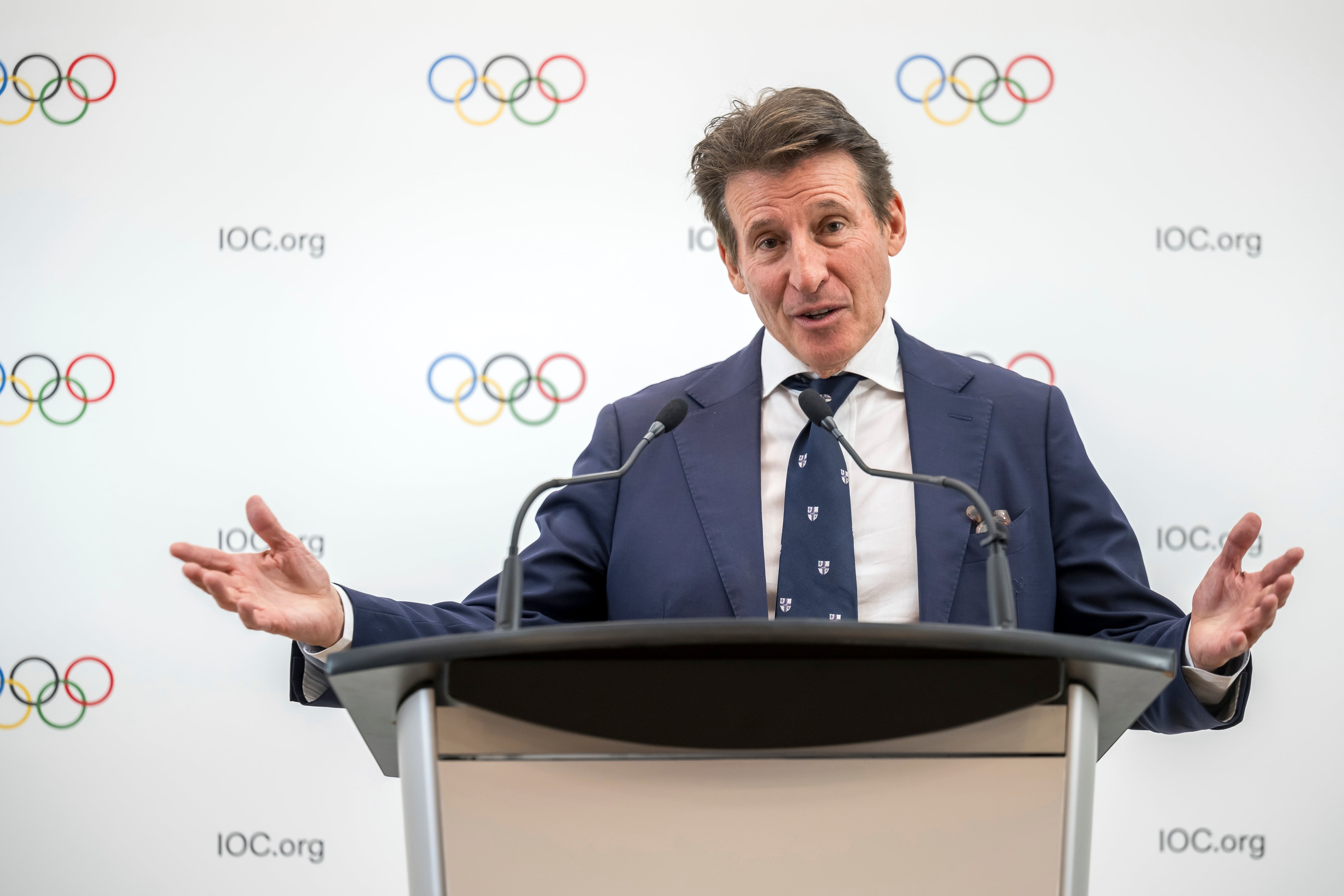
When Seb Coe arrives in the soft-furnished auditorium of the luxurious Costa Navarino resort in Greece, where Thursday’s IOC presidential election will be held, he will know this is his one-and-only shot at the Olympic throne. Aged 68, Coe is technically too old to last a president’s eight-year term and the IOC’s rules will need to be bent if he wins. That can be done, but he certainly won’t be standing at the next election: this is it, now or never.
The IOC president is the most powerful office in sport, carrying sway not just inside the vast Olympic machine but across the globe, acting as politician, diplomat and dealmaker with world leaders including authoritarian regimes – Saudi Arabia is expected to jostle with India and Indonesia for the right to host the 2036 Games.
The new president’s skills will be severely tested over the next decade by challenges from the climate crisis and deep-rooted divides over gender identity, to the arrival of AI and the changing ways fans consume entertainment. Then there is LA ‘28 on the horizon and the ominous prospect of Donald Trump seizing an Olympic Games for his own means.
There are seven candidates running for the presidency in Greece this week, and they are at the mercy of the 109 members who will vote electronically in the room. The membership is an exclusive club of royalty, sports executives and former athletes from all over the world, featuring a Puerto Rican businessman, a former Djiboutian PE teacher, an Aruban swimmer and Princess Nora of Liechtenstein. It is this eclectic mix of people who must decide who takes power.
Among the seven candidates, Coe is seen as a serious contender with the statesmanlike credentials to handle the presidency. He already heads up the Olympics’ biggest sport as president of World Athletics – he has earnt the public backing of Usain Bolt, Mo Farah and Armand Duplantis – and he has a proven track record of delivering success after leading London to victory in the race to host the 2012 Games.
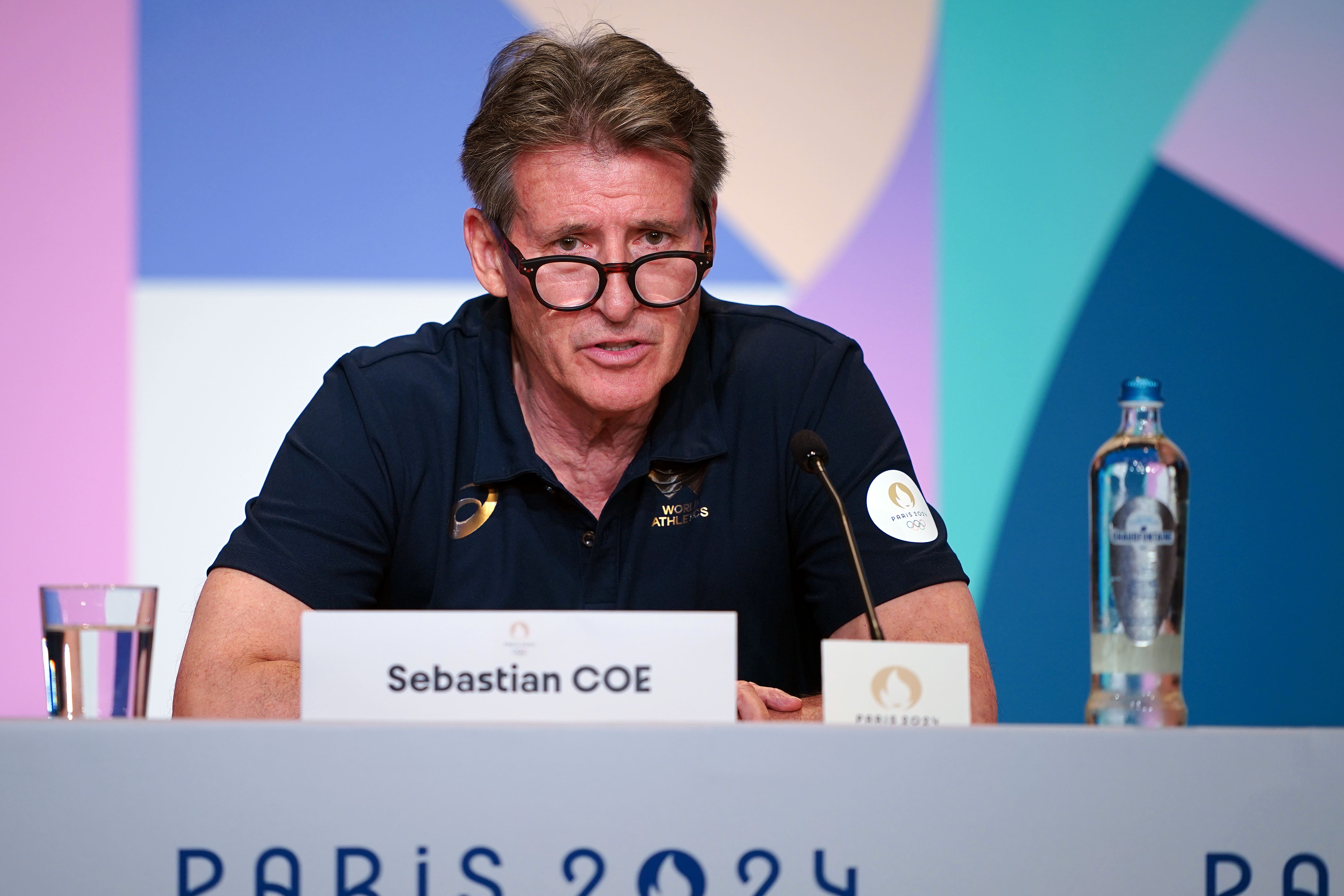
But sources have told The Independent that inside the walls of the IOC’s headquarters in Lausanne, Switzerland, Coe is not without his detractors. He has been outspoken in his criticism of the IOC over a number of issues, not least this oddly secretive election which he condemned for its “lack of transparency” – perhaps fairly, given the lack of scrutiny on the election either by members or the press. Yet such comments cause alarm in the IOC, a reserved and protective organisation.
A particularly contentious moment was Coe’s abrupt announcement of prize money for athletes at the Olympics last year, which caught figures at the IOC off guard. Coe revealed that gold medalists in track and field events in Paris would receive a $50,000 prize, something considered at odds with the Games’ roots in amateurism. A source said that Coe’s move “raised eyebrows”, a serious expression of disapproval in the stoic world of the IOC. “He does not show a lot of love for the IOC,” one member added.
But Coe has a sparkling CV having covered all corners of the Olympic world, chairing a national committee (the British Olympic Association), running a huge sporting federation in World Athletics, delivering London 2012 and twice winning Olympic gold on the track as an athlete. He has worked tirelessly over the past few weeks to convince members that this makes him the right candidate, lobbying for votes via phone calls and face-to-face meetings, listening to members’ concerns in a bid to build a campaign that crosses the wide age, gender and nationality spectrums of the IOC membership.
But there are six other candidates competing for the same 109 votes. Two of those are considered rank outsiders: the British-Swedish head of the International Ski and Snowboard Federation, Johan Eliasch, and the Japanese president of the International Gymnastics Federation, Morinari Watanabe. The head of world cycling’s governing body, David Lappartient, is considered another outside bet among the seven candidates, while the only royalty on the ballot, Prince Feisal bin al-Hussein of Jordan, is widely popular among the membership.
Then there is Kirsty Coventry, a former Zimbabwean swimmer and the most decorated African Olympian in history, looking to become the first female president of the IOC. Coventry is relatively young at 41, and her recent role on the IOC’s Athletes Commission stands her in good stead to relate to those members who are recently retired Olympians themselves, like Australian canoeist Jess Fox and US sprinter Allyson Felix. Coventry also has the not-so-secret backing of incumbent president Thomas Bach.
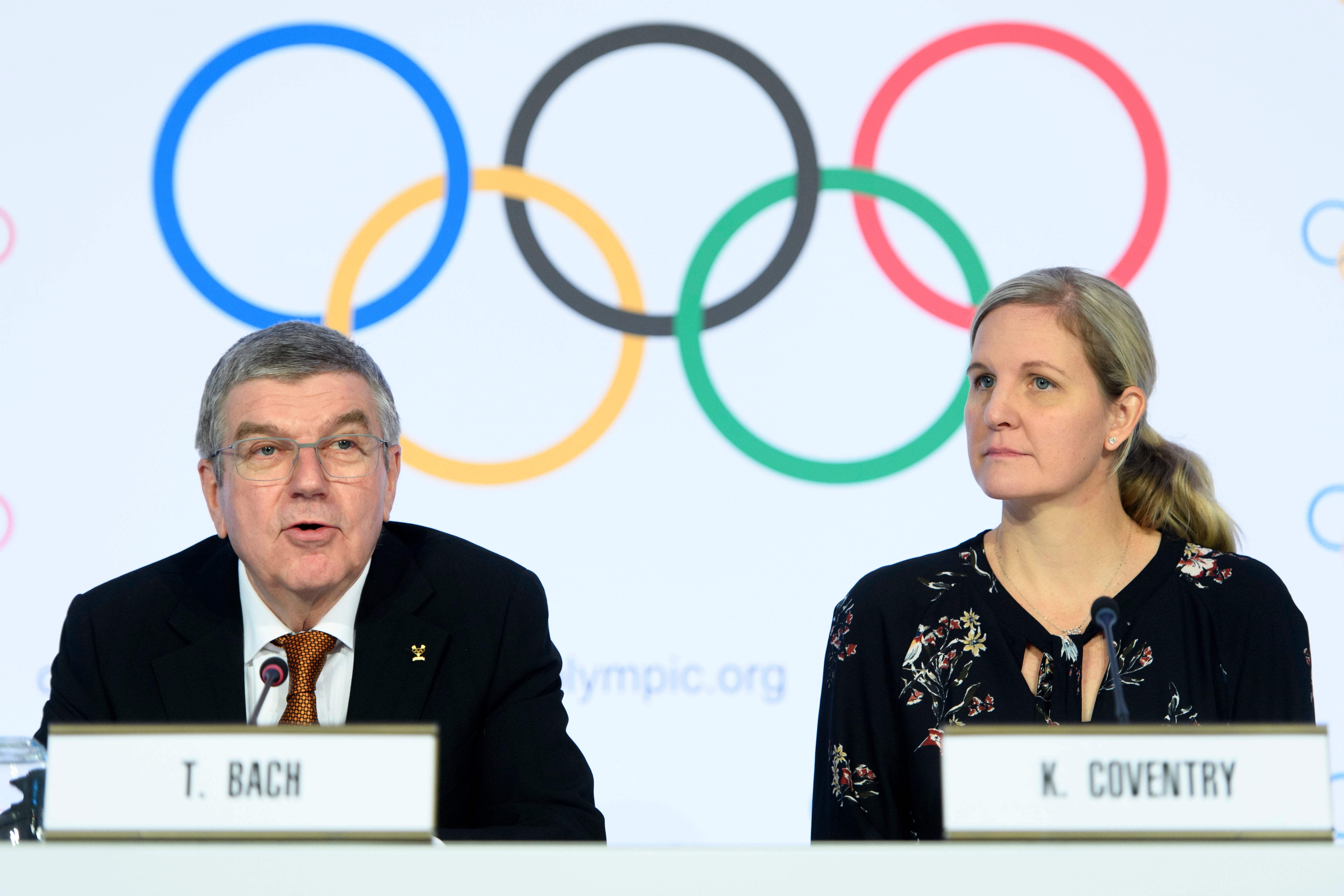
But if Coe is beaten to the prize by anyone, it is most likely to be the Spanish candidate with a famous name in the Olympic world: Juan Antonio Samaranch Jr, son of the IOC’s seventh president who led the Olympic movement through explosive growth and damaging scandal from 1980 to 2001.
Samaranch Jr is hugely respected inside the IOC, having been anointed as a member by his father in 2001 – he has two decades more experience of the organisation than Coe, who joined in 2020. The 65-year-old Samaranch has worked on a wealth of different commissions as well as the executive board and the Spanish Olympic Committee, so, like Coe, when it comes to the IOC presidency, his CV is almost flawless.
Samaranch has pitched himself as the responsible adult in the room at a time of great uncertainty for the Olympic movement. Who will navigate the changing world of broadcasting and streaming? Who will handle the giant burden that is Trump as the Games lands in Los Angeles? Samaranch Jr has tried to convince members that he is the only candidate who can steer the Olympic ship through choppy waters ahead.
He is known as a smart operator, someone who speaks multiple languages and has a wealth of contacts across the sporting spectrum. One source said he has a “cute financial brain”, and his experience on IOC commissions involving TV rights, digital engagement and marketing underpin his business-savvy reputation. His entire campaign for presidency has been carefully delivered, hiring a communications consultancy to tune his message.
The Independent asked Samaranch Jr last week about the scale of the task facing the next president.
“There are many challenges,” he said. “So much is at stake as we confront a rapidly changing geopolitical, technological and economic landscape. Whoever is elected will need the necessary proven diplomatic and political skills to ensure the independence of the Olympic movement is protected, but the president must also have the necessary business experience to thoroughly examine the IOC’s business and revenue model to ensure it can grow and continue to support the whole of the Olympic family.”
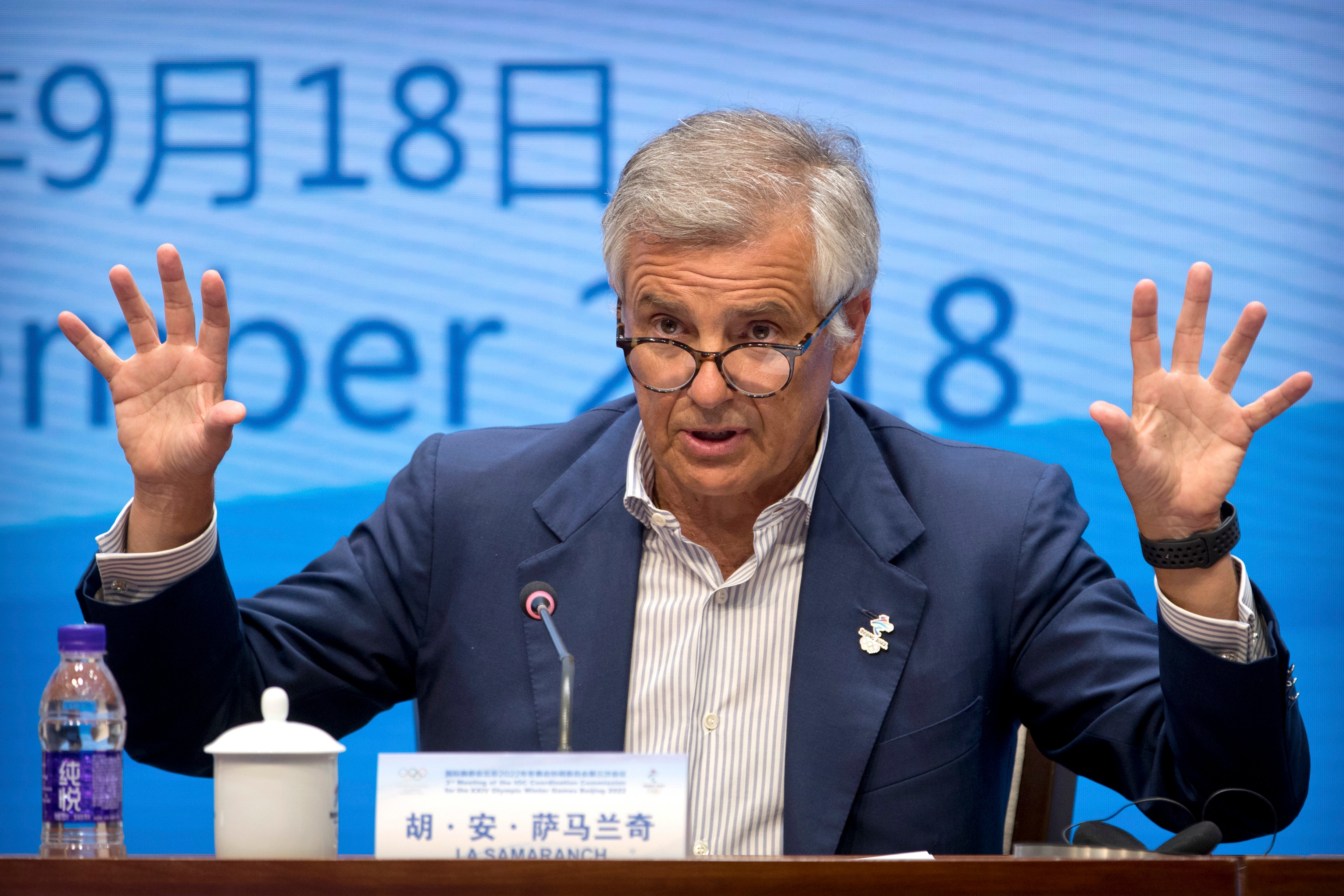
How will he harness young audiences at a time when the youth are finding different ways to consume entertainment? “We have to ensure that our Olympic values are there and relevant for the next generation,” he said. “Whether that is through introducing new events to the Olympic programme, through e-sports and gaming or through new media platforms taking advantage of new technologies like AI.”
The big question around Samaranch Jr is whether his father’s reputation works for or against his campaign.
Samaranch Sr was a towering figure at the IOC during a period when he led a transformation of the Olympics into a global behemoth that accumulated vast wealth, monetising the Games as a TV product while turning the five rings into marketing gold. Alongside its newfound financial might, Samaranch Sr’s ability to unite North and South Korea around the 1988 Seoul Games helped carve out the Olympics’ unique role in the world as a powerful force for change (albeit a force that has been abused, not least by Vladimir Putin who forged a close relationship with current president Thomas Bach before the 2014 Winter Olympics in Sochi).
Samaranch Sr’s latter years at the IOC were mired in controversy when the Salt Lake City bribery scandal exposed corruption, which Samaranch Sr swatted away until it was impossible to do so. Six members were eventually expelled for accepting bribes in exchange for voting for the US city to host the 2002 Winter Games.
Samaranch Sr was embroiled in controversy of his own when it was revealed that his annual bill at the five-star Lausanne Palace hotel was £130,000. He had moved into the palatial suite upon assuming the presidency and installed a private gym, while opulent artwork and sculptures adorned the rooms. He lived there for many years even beyond his retirement shortly after the 2000 Sydney Olympics, a Games which restored some much-needed pride to the IOC’s damaged reputation.
The ascension of Samaranch Jr to the IOC’s membership in 2001 was controversial in itself, and several members abstained or voted against his nomination in an unusual show of dissent against what they saw as naked nepotism. The Samaranch name still carries high acclaim at the IOC – there is a 100-square-metre suite named after him at the Lausanne Palace Hotel with a view over Lake Geneva – and yet his reputation is still an unknown quantity in this election.
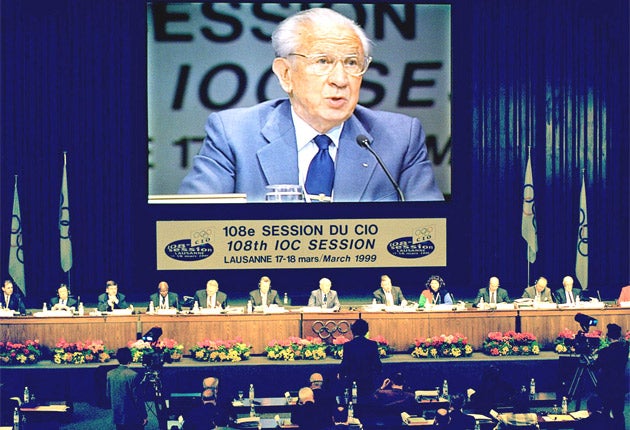
The troubling optics of the IOC’s 10th president being the son of the seventh president is not lost on some members. As one quipped last week: “It’s not a family company.”
Samaranch Jr has trod a careful line during the campaign, stressing his pride in his father’s work while forging a clear path as his own man. “I learned many things from my father and I am deeply proud of his legacy in the Olympic movement,” he told The Independent. “But he was IOC president a quarter of a century ago and very few of the measures and ideas he introduced will be relevant to the next president in 2025.”
No one knows who will win this election, built as it is on a tangled web of alliances within a highly secretive membership. The other five candidates cannot be discounted yet. But if Coe is to rule supreme over the Olympic world, he must loosen the hand of a family who have held a firm grip on the IOC for half a century. The 68-year-old must convince members he offers fresh direction. He will not get another chance.
Join our commenting forum
Join thought-provoking conversations, follow other Independent readers and see their replies
Comments
Bookmark popover
Removed from bookmarks